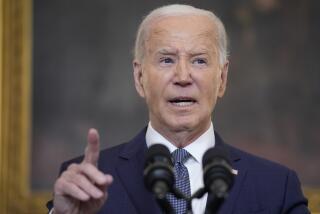N. Korea Says It Will Be a No-Show at Six-Party Talks
- Share via
SEOUL — Dashing hopes for an early negotiated settlement, North Korea said Tuesday that it would not show up for the next round of talks on its nuclear weapons unless the United States first agreed to remove the Communist regime from the list of terror-sponsoring nations, lift economic sanctions and provide energy assistance.
The new conditions were rebuffed by the United States, which along with South Korea and Japan last week had offered a joint statement of principles aimed at getting the North to renounce its nuclear program.
By hiking up the bar for negotiations, North Korea practically eliminated any chance for holding the next round of the six-party talks before month’s end, as the Bush administration had hoped, and cast doubt on the future of the negotiating process.
The North Koreans did say, however, that they would consider suspending all projects to build nuclear weapons if the regime’s demands were met.
“In return for the freezing of our nuclear activities, the United States must remove our country’s name from the list of terrorism-sponsoring countries; lift its political, economic, military sanctions and blockade; and give heavy oil, electricity and other energy assistance,” said an unnamed spokesman for the Foreign Ministry in a statement distributed by the country’s official news service.
“If this takes place, a foundation to continue six-nation talks will be created,” the statement added.
The wording of the statement was sufficiently vague to make it unclear if all the conditions needed to be met before the North Koreans would resume negotiations. According to sources, the regime would like to see shipments of heavy fuel, which were suspended last year, resume before it returns to talks.
In Washington, President Bush appeared to reject the North Korean proposal, saying “the goal of the United States is not for a freeze of the nuclear program -- the goal is to dismantle a nuclear weapons program in a verifiable and irreversible way.”
In an appearance with Chinese Premier Wen Jiabao at the White House, Bush said U.S. officials would continue to work with China “and the other countries to resolve this issue peacefully.”
Richard Boucher, the chief State Department spokesman, later said the U.S. has “repeatedly stated that we’re not going to reward North Korea for its violations of its international commitments. Nor are we going to provide rewards to achieve their compliance with obligations they’ve already taken on and subsequently violated.”
He said the U.S. was ready for another round of six-party talks. “We call on North Korea to drop its preconditions to the talks and to join the other parties as soon as possible.”
Tuesday’s statement by the North seems certain to tie up the already-cumbersome process with more haggling about what it will take to get Pyongyang back to the bargaining table.
The North Koreans have demanded repeatedly that they talk bilaterally with the U.S. and have complained bitterly about the six-party negotiating process, which also includes China, Japan, Russia and South Korea. The first round of the six-way talks took place in August in Beijing and ended inconclusively.
Bush announced in October that the U.S. would offer guarantees it would not attack the North in return for the dismantling of the nuclear weapons program. But on Tuesday, the North Koreans scoffed at the offer.
“It is unthinkable that we would agree to disarm ourselves only in exchange for the lukewarm pledge,” the Foreign Ministry spokesman said.
*
Times staff writer Paul Richter in Washington contributed to this report.
More to Read
Sign up for Essential California
The most important California stories and recommendations in your inbox every morning.
You may occasionally receive promotional content from the Los Angeles Times.









